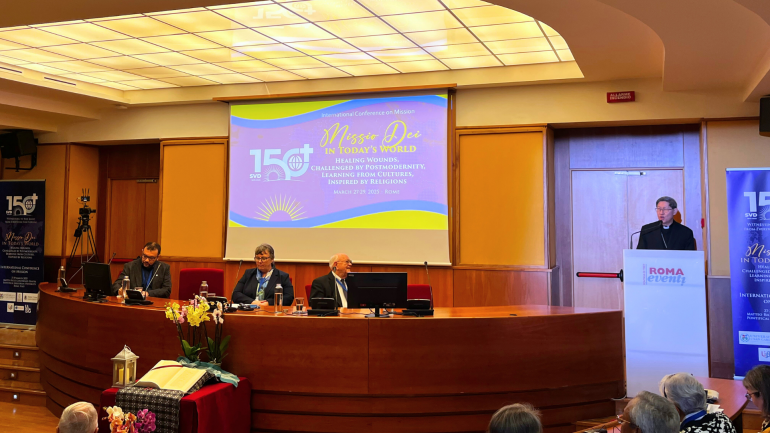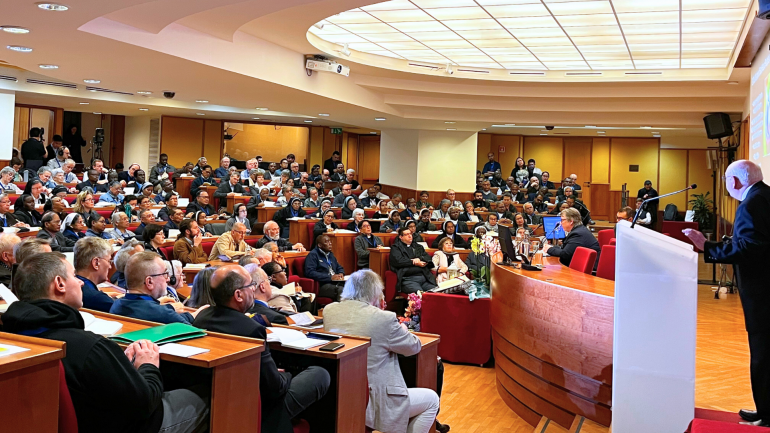Missio Dei Today: 150 Years of healing mission and global witness
The Society of the Divine Word (SVD) officially opened its three-day International Conference on Mission at the Matteo Ricci Conference Center of the Pontifical Gregorian University, drawing over 250 participants from across the globe.
The conference, with its theme "Missio Dei Today: Healing Wounds, Challenged by Postmodernity, Learning from Cultures, Inspired by Religions,” running from March 27 to 29, commemorates the 150th anniversary of the congregation’s founding by Saint Arnold Janssen in 1875.
In his opening remarks, SVD Superior General Fr. Anselmo Ribeiro welcomed the diverse participants, noting that the SVD now serves in 79 countries with nearly 6,000 priests and brothers.
Ranked among the top five male Catholic missionary congregations worldwide, the SVD is actively engaged in pastoral ministry, education, communication, biblical apostolate, and the promotion of social justice.
Cardinal Luis Antonio Tagle, Pro-Prefect of the Dicastery for Evangelization, delivered an inspiring inaugural address. Reflecting on John 20, he emphasized the significance of the Risen Lord’s wounds as a source of missionary mandate.
“The risen Lord came to his disciples who were hiding out of fear,” he said. “He showed them his wounds. He greeted them with peace, not with reproach. He breathed the Holy Spirit on them and sent them on a mission of reconciliation.”
Tagle emphasized the significance of intercultural missions, stating that confronting others or strangers is an inevitable aspect of life. The risen Lord called Mary by her name and sent her as a missionary to his disciples.”
Renowned theologian Prof. Stephen Bevans, SVD, delivered the keynote address on "Healing, Dialogue, and Cultural Encounter." He reframed Missio Dei as God’s dynamic of love and redemption.
“Mission is not the Church’s task, but God’s movement of love toward creation,” Bevans said. “We are partners in God’s dream—to heal creation, foster peace, and witness to divine love from everywhere, for everyone.”
He urged the Church to engage today’s world with humility, respect for cultures, and openness to religious dialogue.
Two thought-provoking plenary talks followed. Nicoletta Gatti from the University of Ghana presented "Wounded Yet Healed: 1 Peter Offers Living Hope for a Broken World," highlighting the call to a spirituality of vulnerability.
“Missio ad vulnera—mission to the wounds—is the Christian call to dwell among suffering and to transform it into healing,” she explained. “Christ’s wounds become shelter and strength for others through our witness of hope.”
Former Philippine Senator Leila de Lima delivered a moving reflection titled "Church as Sanctuary," recounting the role of the Catholic Church during the Philippines’ war on drugs. She honored church leaders who stood with victims amid violence.
“While I was in prison, it was the Church that did most of the work,” she said. “The Church became a sanctuary and savior during one of the darkest chapters in the nation’s recent history.” Calling for collective reflection, she added, “We are not Jesus Christ, but we must resist the devil’s mocking and false peace.”
Participants also joined workshop sessions that explored specific mission dimensions: Recreating and Empowering Lives of the Wounded and Homeless—Fr. Flavie Villanueva, SVD (Philippines), Transforming Violence and Restoring Human Dignity in Latin American Contexts – Sr. Petronella Maria Boonen, SSpS (Brazil), Healing the Wounds of Nature: The Role of the Missionary—Fr. Joseph Kwame Blay, OFM (Ghana) and Missio Dei and Migration: Pains of Labor and Healing Wounds—Prof. Gioacchino Campese, CS (Italy)
As the conference unfolds, it offers a rich space for reflection, exchange, and renewal—challenging participants to embody Missio Dei, the mission of God, in a wounded world through compassion, cultural dialogue, and unwavering faith.
Radio Veritas Asia (RVA), a media platform of the Catholic Church, aims to share Christ. RVA started in 1969 as a continental Catholic radio station to serve Asian countries in their respective local language, thus earning the tag “the Voice of Asian Christianity.” Responding to the emerging context, RVA embraced media platforms to connect with the global Asian audience via its 21 language websites and various social media platforms.















